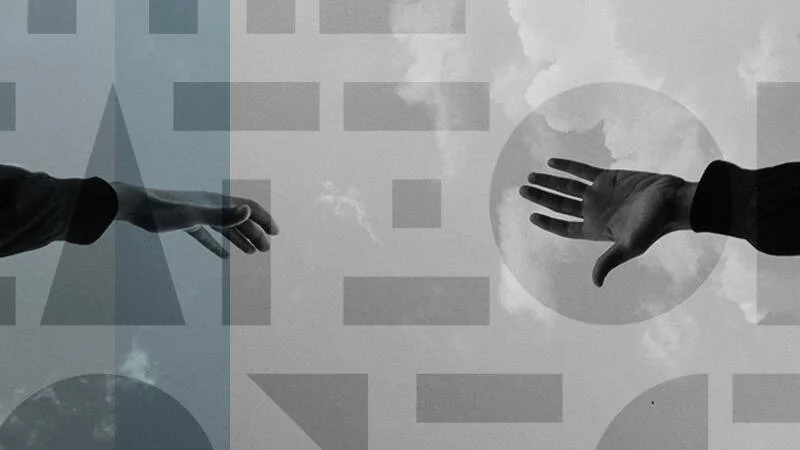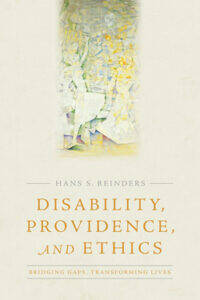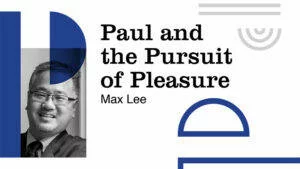What, if anything, has divine providence to do with disability? This is the opening question of Reinders’s book. For me, there is no ‘if anything’ about it. This is one of the most pressing questions that could possibly be asked. The question of what divine providence has to do with suffering was instrumental in my conversion to Christianity, since it was there alone that I found a satisfactory answer.
The Burden of Explanation
I approach this topic as one who is not myself disabled in the conventional sense. I have a healthy body and mind for my age. Yet, I remember reading in one of Joni Eareckson Tada’s books the very helpful view that we are all disabled; we are all weak, all flawed, all born into a frustrated creation, subject as it is to decay and death. It is only sensible that disability studies scholars have coined the phrase “temporarily able bodied . . . to indicate that ‘disability,’ in some form or other, is part of the human condition” (p. 193, n28). Indeed, ‘able bodied’ is a terrible misnomer. Even the greatest ballerina, or the gold medalled gymnast, is only able to perform after years of intense training, and only for a short time.
This is not to deny that some people suffer more than others, or have a more difficult life than others. The distribution is intensely uneven. It is merely to point out that it is the height of ludicrous hubris to think that the ‘normal’ human body, for all its marvels, is anything but limited and decaying. It is, moreover, a massively over-realised eschatology to think that we should have comfortable lives without suffering, that a healthy body is both normal and to be expected.
Yet today we—the wealthy minority world, at least—do expect that. Our eschatology is over-realized, ironically often precisely because of the abilities God has given us to carry out responsible dominion, however irresponsibly we do so. We expect comfort and increasingly teach our children to expect it, to expect that easy physicality, absence of illness, satisfying interior lives and pleasure in general are a right. They are not. We are all limited, fallen and part of the decaying world, subject to frustration. People with more overt disabilities we might not think of as disabled so much as even more disabled. As Reinders says, with keen insight, there is no burden of ‘explanation’ for a disabled person any more than there is for a ‘normal’ person.
A Fallen and Cursed World
This is part of the ‘explanation’ for disability that I would have expected to find in Reinders’s book. However, Reinders does not make much of the doctrine of the fall; that this world is cursed, and so we should expect it to be one in which bad things happen to good people. Would this help some of his perplexities? While there is no answer to the particular ‘why?’ question, we do have an answer as to why suffering in general is present in this world (something that Calvin discusses extensively). Moreover, if we have a doctrine of the fallen world, we can include the idea that God deliberately causes frustration and unfairness for good reasons—“Neither this man nor his parents sinned,” Jesus said of the man born blind in John 9:3, “but this happened so that the works of God might be displayed in him.” More generally, God uses suffering as a warning, that all might repent, as Jesus points out concerning people who suffered various disasters in Luke 13:1-5: “Do you think they were more guilty than all the others living in Jerusalem? I tell you, no! But unless you repent, you too will all perish.” There is an explanation for suffering, but it is at a corporate not individual level. The individual who suffers is no more guilty than any other, but is born into a frustrated world in which these things can happen to anyone. (This truth is not completely absent from Reinders’s account, but it is present without much investigation.)
Finding Comfort in Calvin
Possibly linked to this, Reinders finds Calvin’s views on providence either wrong or, at the very least, inadequate for real comfort. Here again I find I am not in agreement. I cannot answer for what Reinders personally finds comforting or not; yet I know that Calvin’s writing on providence has been of immense comfort to me in the face of grief and fear. “From Calvin’s classical doctrine of providence it is unlikely that people findI do wonder if Reinders’s sensitive foray into providence and suffering needs to be pitted against the traditional views. Calvin’s theology, in my reading at least, is very far from presenting a God who is arbitrary. the comfort and trust in the future, the sense of purpose in their lives, that they were looking for” (p. 157). But that is exactly what I have found in Calvin’s writings. Moreover, I am not sure why Reinders contrasts Calvin so strongly with an emphasis on Christ, and God’s will being done ‘in Christ.’ See, e.g., John Calvin, Sermons on the Epistle to the Ephesians (Edinburgh: Banner of Truth, 1973), 339–340.
I do wonder if Reinders’s sensitive foray into providence and suffering needs to be pitted against the traditional views. Calvin’s theology, in my reading at least, is very far from presenting a God who is arbitrary; meaning and purpose are not hidden at all. Trust in God’s absolute sovereignty can be a great comfort, and the knowledge that we do not and cannot have all the answers in our own creatureliness is only reasonable. Some of my greatest pastoral comfort has come from reading Calvin.
In the end, I wonder if Reinders has offered a different view of providence from the traditional formulations, or whether he is merely a drawing out these views in a more narrative-based way. He is right to say that what people need, after the disruption of intrusive tragedy, is a way back to a sense or understanding of God’s presence. But ‘providence’ is a theoretical construct of theology; it can be discussed from an objective or subjective point of view. Reinders’s discussion of the way in which a sense of God’s presence provides an alternative story to tell around suffering is different from the way in which Calvin discusses providence—but is this simply a case of Calvin not speaking in twenty-first century therapeutic terms? Calvin is not lacking in talk of God’s love, care and presence, nor is he lacking in how to apply providence meaningfully to life’s difficulties; and he speaks much of being in Christ, spiritually united with him, although Calvin discusses this more in relation to justification than providence.
Providence and Pain
Whichever way we take the relationship between Calvin’s views and Reinders’s, what we have here is a helpful discussion of providence that never forgets the real pain of those who face the difficulties of disability. Reinders is right to remind us that theodicy only goes so far; there must be time for lament.Even the person who can definitely say ‘God is doing this for good’—even one who can see the good that is happening—may still want to say ‘but I want a different good. Not this one.’ Pain is still pain, however meaningful it may be. Even the greatest trust in God may never make suffering easy. Easier, possibly, than facing it with only a bleak and despairing view of the world, but pain is never easy. Even the person who can definitely say ‘God is doing this for good’—even one who can see the good that is happening—may still want to say ‘but I want a different good. Not this one.’ Pain is still pain, however meaningful it may be.
“They have to redefine their story, find ways to live a new life with old selves that must change” (p. 32). This redefined story is found in the biblical account of the world. People need answers—and how much better if they already had the answers before the crisis came. Experience of disability is a tragedy “because it is prior to discovering the grounds on which that experience can be contested” (p. 159). This is a challenge to the churches: to teach people about God’s providence before tragedy strikes, so they might in some amount be prepared.
That still will not make the experience at all painless. Having answers for why there is suffering in the world gives a certain level of understanding, and it is definitely better than having a wrong understanding—or no understanding at all. Yet the pain will still be real. Amy Julia Becker is quoted as saying that she previously would have seen a child with Down syndrome as “evidence of the fractured nature of all creation” (p. 37)—but she could not imagine that about her daughter. No, it is so much harder when it is personal. That is why lament is so important. We are emotional beings, not just theological intellects. But the theology has to frame the emotion, otherwise we will just get it wrong.
Yet Reinders is right that even deepest pain can be transformed, or transforming. This too is God’s gracious, providential care for those who have been hurt in a fallen world. It is possible, as some of these stories show, to come to see God’s goodness through suffering. It is not the opposite of asking why—indeed, it might be the answer to why.








Comments
Be the first one to make a comment!